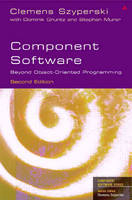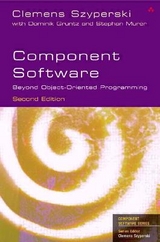
Component Software
Addison-Wesley Educational Publishers Inc (Verlag)
978-0-201-74572-6 (ISBN)
- Titel ist leider vergriffen;
keine Neuauflage - Artikel merken
The author describes his book as a "unique blend of market and technology coverage, broad and fair coverage of current technologies and a deep discussion of real problems with their solutions where known". The first edition won the "Jolt Award" became the leading book on the market to combine explanations of what the key technologies are, how to use them and why they are important in the software market-place, and look at these in terms of both the technical and business issues. The book was also the first to define components and clarify the key questions surrounding them, show how they are key to software design and offer a historical overview of their development.
Clemens Szperski joined Microsoft Research at its Remond, Washington Facility in 1999 to continue his work component software. In 1992 he received a PhD in Computer Science from the Swiss Federal Institute of Technology, Zurich where he designed and implemented the extensible operating system Ethos. In 1993 he co-founded Oberon Microsystems, Inc developer of BlackBox Component Builder, first marketed in 1994 and one of the first development environments and component frameworks designed specifically for component-oriented programming projects.
I. MOTIVATION: COMPONENTS AND MARKETS
1. Introduction
2. Market versus technology
3. Standards
II. FOUNDATION
4. What a component is and is not
5. Components, interfaces, and re-entrance
6. Polymorphism
7. Object versus class composition, or how to avoid inheritance
8. Aspects of scale and granularity
9. Patterns, frameworks, architectures
10. Programming: shades of gray
11. What others say
III. COMPONENT MODELS AND PLATFORMS
12. Object and component 'wiring' standards
14. The Microsoft way: COM, OLE/ActiveX, COM+, and .NET CLR
15. The Sun way: Java, JavaBeans, EJB, and Java 2 editions
16. More customs than customers?
17. Strategic comparison
18. Efforts on domain standards
19. Open problems
IV. COMPONENTS MEET ARCHITECTURE AND PROCESS
20. Component architecture
21. Component frameworks
22. Component development
23. Component distribution and acquisition
24. Component assembly
25. On the horizon
V. MARKETS AND COMPONENTS
26. Future markets
27. New professions
28. A component marketing paradox
Epilogue
Appendix A. Java versus C# versus Component Pascal
Bibliography
Glossary
Index
Zwar reden heute einige Leute nur noch von Serviceorientierung, aber man darf nicht vergessen, dass moderne Software, die wir mit .NET oder Java erstellen, in erster Linie objektorientiert und komponentenorientiert ist. Viele Softwareentwicklungsprojekte brauchen zudem gar kein SOA, allenfalls SOA light. Bei dem SOA-Hype scheinen einige Nachwuchsentwickler die Grundgedanken der Softwarekomponentenwelt nicht mehr lernen zu wollen. Clemens Alden Szyperski hat in der Fachwelt einen Namen für Komponentenorientierung. In seinem Buch grenzt er Komponentenorientierung von Objektorientierung ab und stellt die wesentlichen technischen und organisatorischen Konzepte der komponentenorientierten Softwareentwicklung vor. Er zeigt zudem, wie sich die Konzepte in CORBA/CCM, Java/EJB, COM/ActiveX und .NET manifestieren, wobei der .NET-Teil hier sehr schwach ist. Das Buch ist aber auch schon 2002 erschienen als .NET gerade erst auf dem Markt war. Aber da Clemens Szyperski ja inzwischen bei Microsoft Research arbeitete, durfte ein Kapitel zu .NET wohl nicht fehlen.
Holger Schwichtenberg
| Erscheint lt. Verlag | 15.11.2002 |
|---|---|
| Reihe/Serie | ACM Press |
| Zusatzinfo | glossary |
| Verlagsort | New Jersey |
| Sprache | englisch |
| Maße | 160 x 237 mm |
| Gewicht | 1751 g |
| Themenwelt | Informatik ► Software Entwicklung ► Objektorientierung |
| ISBN-10 | 0-201-74572-0 / 0201745720 |
| ISBN-13 | 978-0-201-74572-6 / 9780201745726 |
| Zustand | Neuware |
| Haben Sie eine Frage zum Produkt? |
aus dem Bereich



